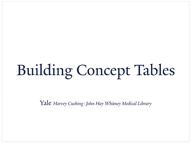Search terms within columns were combined with OR, the three columns were combined with AND.

Follow a plan
Even though you might jump into google and do a couple of searches, it is a good idea to plan or map where you are going to search and what words you are going to use.
Making a map or a plan is great for brainstorming and making connections between your ideas ie key words, and building your list of relevant terms as new words occur to you.
Mind mapping is particularly useful if your topic is fairly broad and might have different aspects to research. Use a mind map to identify additional questions that might flow from the research question.
Having a plan helps you to identify search terms and similar key words or terms and be consistent when searching in more than one search engine, catalogue or database.
AND you can also keep a record of the places you have searched.
A map/plan is a great organising tool - everything is in one place.
A concept table or logic grid helps you identify search terms, is one way of visualising your search and helps you organise your search words.
Remember to:
Join different CONCEPTS with AND
Join different SYNONYMS with OR
My plan
Topic .................Is bariatric surgery beneficial for obese teenagers?
| Concept 1 | AND | Concept 2 |
| bariatric | | teen/teens/teenagers |
| OR | OR | |
| gastric band/s/ing | adolescent/s | |
| OR | ||
| adolesence | ||
| OR | ||
| "young people" |
Search these databases
| Scopus | Remember to check cited by links in Google Scholar and Scopus | |
| maybe Cochrane Library and PubMed instead of Scopus? | Add in the beneficial / quality of life terms if results are not specific enough or there are too many results | |
| Google Scholar | ||
| PsycINFO? might have something about the psych effects? | ||
| Child development & adolescent studies? | ||
Some people prefer to structure keywords in their plan as:
| bariatric OR gastric band/s/ing | |
| AND | teen/teens/teenagers OR adolescence OR adolescent/s OR "young people" |
| AND | "quality of life" OR beneficial OR benefit/s |
![]() Watch the short Building Concept Tables video
Watch the short Building Concept Tables video

| Sometimes it is best to start simply, using the most obvious key words or concepts in your plan. If you get enough useful and relevant results you may not have to do further searching using more of your synonyms. |
Example search preparation
This was the search prepared for an indepth research project on the impact of bariatric surgery on quality of life. In most cases you will not need this level of detail unless you are doing a systematic review or meta-analysis.
| Terms related to obesity | Terms related to bariatric surgery | Terms related to quality of life |
|---|---|---|
obesity "over weight" overweight "over eating" overeating "weight loss" weight reduc$ obese
| bariatric surgery antiobesity surg$ obesity surg$ restrictive surgery gastroplasty gastrogastrostomy gastro gastrostomy jejuno-ileal bypass jejunoileal bypass gastrointestinal diversion$ biliopancreatic diversion bilio-pancreatic diversion biliopancreatic bypass bilio-pancreatic bypass gastric band$ silicon band$ gastroenterostomy sleeve gastrectomy gastric sleeve LAGB stomach stapl$ lap band$ lapband$ malabsorptive surg$ mason$ procedure Roux-en-Y malabsorptive procedure$ duodenal switch$ | "quality of life" qol hrql hrqol |
Lindekilde N, Gladstone BP, Lubeck M, Nielsen J, Clausen L, Vach W, et al. The impact of bariatric surgery on quality of life: a systematic review and meta-analysis. Obes Rev.2015;16(8):639-51. doi:10.1111/obr.12294
Edit page



